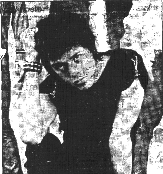|
Support CatholicBoy.com! |
Brian MarnellHe Overcame Heroin, Then Died on the Way BackNote: the majority of the article is a letter written by Jim Carroll to Marnell's family.  Brian Marnell: The creative force behind SVT. Songwriter-guitarist Brian Marnell died last month, ironically, after fighting and overcoming a heroin habit. As the creative force behind SVT, Marnell was a real talent and could have been a contender. His song, "Heart of Stone," while only released on a small local label, made plenty of noise--and was later recorded by Marty Balin. Shortly before his death, Marnell traveled to New York to record a song he wrote with Jim Carroll, whose new album is expected later this month. Carroll, author of the acclaimed "The Basketball Diaries" and a Pulitzer Prize noininee while still in his teens, wrote an emotional tribute to his friend and musical associate and sent it to Marnell's, family.
"I felt sadness," wrote Carroll. "I felt confusion . . . I felt anger at the theft of another talented musician and another friend. That very week, two or three days prior to his death, I spoke with at least three common friends who had spoken to Brian and commented on his good spirits and his desire for more work. He had been writing new songs, expressing renewed ambitions. There are other angers I felt, other contributors to the theft. There are no reasons I feel it necessary to name them here and now . . . suffice to say that these robbers have claimed too many. Brian should have been spared. "He had outdistanced this enemy to life and spirit, had put months between it and himself. The gossipmongers will have their tales to wag, but the facts contradict all that. Brian Marnell was clean. His body was simply weak. He was inexperienced in the process ... in the motions of outrunning the insidious manifestation of a notion all pervasive and WRONG. That is the tragedy; it was that inexperience that killed . . . he let his weight drop drastically, even as his spirit began to rise and fight and win. Brian loved life. He was giving . . . innocent and naive as a teardrop. It is those who want to escape that become escape artists. Brian wanted to escape nothing; he wanted to plunge straight ahead. He was taken only by a misguided notion, guilty only to the allure of a false romance. His body was too weak as he tried to reclaim it. A toll had been taken. A lesson should be learned. "I, in a selfish sense, lost a lot. Brian was a newfound and powerful collaborator. We had been friends for years, and always spoke of working together. It was only in this past year we got it together. I sent Brian some lyrics for my new LP. He sent back a demo of incredible force. He came to New York to play on that song, and wound up playing a spare stinging lead on another song and backing vocals on what seems like everything on the record. To me, the song we wrote together is in many ways the strongest on the album . . . it is surely my personal favorite. "I wanted more, but I'm glad we got what we did. There was a strong chance that he was going to become a member of the group when we began touring on the record's release. We lost that, as well . . . but, again, his work is there, preserved by the grooves. His spirit is there, too. In these ways, Brian did leave the thief quite far in the distance. The last word was his . . . in his music, his spirit, in the friends who mourn his death, their loss. Think about his song 'Heart of Stone.' It's pure craft and inspiration. It comes from a timeless place, that type of music. I demand he is not forgotten, in each and all of many ways, in his life and in his death." To close one song on his album, Carroll picked pieces of five poems and five musicians read them slmultaneously into one microphone. He gave Marnell some lines from "Seasons in Hell" by Rimbaud: "Am I to be carried off like a child, to play in paradise, forgetful of all sorrow? ... Spiritual combat is as brutal as the battle of men, but the vision of justice is the pleasure of God alone . . . Meanwhile, this is the vigil. Welcome then, all the influx of his vigor and real tenderness. And, in the dawn, armed with ardent patience, he shall enter magnificent cities."
|
Site Map | Contact Info | About this site | About the webmaster
The Jim Carroll Website © 1996-2025 Cassie Carter